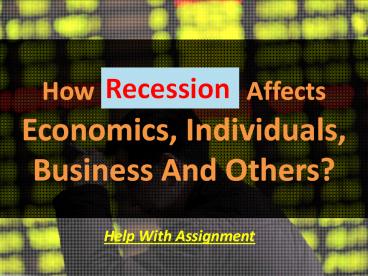How Recession Affects Economics, Individuals, Bussiness And Others?
Title:
How Recession Affects Economics, Individuals, Bussiness And Others?
Description:
In Economics, Recessions can be found in business cycles. Business cycles are the total ups and downs of an entire nation or possibly the entire world from time to time, over a period of more than 10 years. –
Number of Views:45
Title: How Recession Affects Economics, Individuals, Bussiness And Others?
1
How Recession Affects Economics, Individuals,
Business And Others?
Recession
- Help With Assignment
2
In Economics, Recessions Can Be Found In Business
Cycles.
3
- Business cycles are the total ups and downs of an
entire nation or possibly the entire world from
time to time, over a period of more than 10
years.
4
- Recession in Economics is considered to be a
decline in economic activity.
5
- An economy operating at its potential level is
said to be at full employment. At full
employment, some unemployment occurs. - This is consistent with the shifting of workers
between jobs due to changing tastes and
technology.
6
- A recession occurs when GDP falls significantly
below its full employment level.
7
- The Department of Commerce defines a recession as
when real GDP declines for two consecutive
quarters.
8
- Two types of recessions occur-
9
1
- Output can fall if the economy is operating at
below its potential (full employment) level.
2
Output can fall if the economys potential
level of output falls.
10
1
- The first type of recession occurs when output
falls significantly below its full-employment
level in a recession. - Unemployment grows as a large number of workers
cannot find work.
11
- The most dramatic recession of this type was the
Great Depression, where 25 percent of the
workforce was unemployed and real output fell
more than 30 percent.
12
- This type of recession usually occurs when
consumers and investors reduce their aggregate
spending.
13
2
- The second type of recession occurs when the
economys potential output falls. - For example, a nation that passed a minimum wage
of 2000 will likely experience massive
unemployment and a recession. Its potential
output has decreased.
14
- As another example, a decline in efficiency or a
decline in technological progress could cause
output to fall. - Even if unemployment rises, the economy may still
be fully employed in the sense that employers are
fully hiring all workers they can.
15
The difference between
Is CRUCIAL
Decline due to full-employment output falling
below its full-employment level.
Decline due to full-employment output falling.
16
- The first type of decline fits recessions
described by Keynesian and monetary economists,
each giving different reasons for the decline in
spending.
The second type fits recessions described by
rational expectations economists, who give
different reasons for the decline in
full-employment output.
17
Why Recessions occur
18
- Two startling facts exist about modern
capitalistic economies.
The first is that they have recessions
The second is that most of the time they are not
in recessions.
19
- This suggests that some cause occasionally
derails the economy.
Yet, over time, the economy rebounds to full
employment.
20
- But how can an economy recover?
The explanations are given below.
21
Monetary Economists
- This school of classical economists observes that
sudden and large decreases in the money supply or
decreases in the rate of monetary growth usually
precede recessions.
22
While the economy naturally tends to be fully
employed, sudden unexpected declines in the money
supply will decrease total spending, decreasing
the economy until people and prices can adjust to
having less cash.
23
Keynesian Economists
- John Maynard Keynes emphasized the importance of
total spending and the components of total
spending (consumption, investment, government
spending and net exports). In particular, he felt
that when people reduced consumption spending to
save more, financial markets in times of
uncertainty would be unwilling to spend the new
savings on investments.
24
Keynesian Economists (Continue)
Keynesian Economists (Continue.)
- The result would be a decrease in total spending.
Keynes also believed that prices are sticky
resistant to changes. The mix of less spending
and fixed prices means lower output and a
recession. Keynesian today put a similar emphasis
on total spending and the rigidity of prices for
explaining the business cycles.
25
- For more details you can visit our website at
- http//www.helpwithassignment.com/economics-assign
ment-help
26
(No Transcript)






























